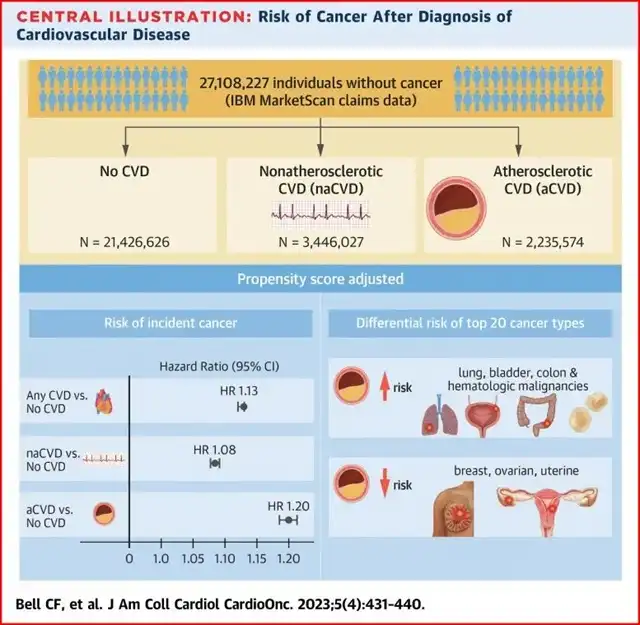Study of 27 Million People: Cardiovascular Disease Patients May Be More Prone to Cancer
- Normal Liver Cells Found to Promote Cancer Metastasis to the Liver
- Nearly 80% Complete Remission: Breakthrough in ADC Anti-Tumor Treatment
- Vaccination Against Common Diseases May Prevent Dementia!
- New Alzheimer’s Disease (AD) Diagnosis and Staging Criteria
- Breakthrough in Alzheimer’s Disease: New Nasal Spray Halts Cognitive Decline by Targeting Toxic Protein
- Can the Tap Water at the Paris Olympics be Drunk Directly?
Study of 27 Million People: Cardiovascular Disease Patients May Be More Prone to Cancer
- Should China be held legally responsible for the US’s $18 trillion COVID losses?
- CT Radiation Exposure Linked to Blood Cancer in Children and Adolescents
- FDA has mandated a top-level black box warning for all marketed CAR-T therapies
- Can people with high blood pressure eat peanuts?
- What is the difference between dopamine and dobutamine?
- How long can the patient live after heart stent surgery?
Study of 27 Million People: Cardiovascular Disease Patients May Be More Prone to Cancer
Cardiovascular disease and cancer are leading causes of death globally, often coexisting. Previous research has shown that they share common risk factors and possibly more complex pathophysiological mechanisms. Animal studies suggest that cardiovascular disease can accelerate cancer progression.
A recent analysis published in a JACC journal subissue indicates a significant increase in cancer risk among cardiovascular disease patients. Particularly, patients with atherosclerotic cardiovascular disease have a 20% higher risk of cancer.
The analysis included 27.2 million residents, with an average age of 43.3 years and 55.7% being female. The median follow-up period was 33 months.

The data shows that cardiovascular disease patients have a higher cumulative cancer incidence compared to those without cardiovascular disease. The cancer cumulative incidence is higher among patients with atherosclerotic cardiovascular disease compared to other cardiovascular disease patients.
When compared to residents without cardiovascular disease, the risk of cancer is increased by 20% for patients with atherosclerotic cardiovascular disease and 8% for other cardiovascular disease patients. Compared to other cardiovascular disease patients, those with atherosclerotic cardiovascular disease have an 11% higher risk of cancer.
Further analysis revealed that even after adjusting for smoking status, body mass index, and heart failure, the risk of developing cancer remains significantly higher for patients with atherosclerotic cardiovascular disease and other cardiovascular diseases. The risk of developing cancer remains higher for patients with atherosclerotic cardiovascular disease compared to other cardiovascular disease patients.
Analysis of cancer subtypes shows that patients with atherosclerotic cardiovascular disease have a significantly higher risk of lung cancer, bladder cancer, colon cancer, head and neck cancer, liver cancer, prostate cancer, pancreatic cancer, kidney cancer, lymphoma, leukemia, and other hematologic malignancies compared to other cardiovascular disease patients. However, the risk of breast cancer, ovarian cancer, and uterine cancer is significantly lower for patients with atherosclerotic cardiovascular disease. Compared to other cardiovascular disease patients, those with atherosclerotic cardiovascular disease have a 58% higher risk of bladder cancer, 53% higher risk of colon cancer, 43% higher risk of lung cancer, 42% higher risk of lymphoma, 40% higher risk of leukemia, and 42% higher risk of other hematologic malignancies.
Researchers suggest that the association between cardiovascular disease and cancer is mediated by common biological processes (such as inflammation, metabolic adaptation, etc.) independent of traditional shared risk factors. Genome-wide association studies indicate that the most important genetic variants associated with atherosclerosis are located at a well-known cancer gene locus on chromosome 9p21, rather than genes regulating traditional cardiovascular risk factors. Inflammation and immune cell activation are also implicated. The CANTOS study found that anti-interleukin-1β antibody can reduce adverse cardiovascular events while also reducing lung cancer and cancer mortality rates.
Recent studies have found that macrophage checkpoint inhibitors used to reactivate anticancer immune surveillance mechanisms in lymphoma patients can also reduce vascular inflammation. In addition, the clonal hematopoiesis of indeterminate potential (CHIP) process is also associated with coronary artery disease. The exact molecular mechanisms linking CHIP mutations to heart disease are not yet clear, but inflammasome activation is thought to be central to this process.
A concomitant editorial emphasizes the interaction between cardiovascular disease and cancer from the perspectives of shared risk factors, pathophysiological mechanisms, and epidemiology. The prevalence of cardiovascular disease in newly diagnosed cancer patients is high (17% to 43%). Both diseases share common risk factors such as advanced age, smoking, diabetes, obesity, and environmental exposure. Pathophysiological mechanisms such as inflammation and oxidative stress are common to both diseases.
The editorial also points out the need for specific screening for lung and colon cancers in patients with atherosclerotic cardiovascular disease. Given that the high cancer incidence among cardiovascular disease patients in the study was unrelated to tobacco exposure, early screening may be beneficial for patients with early-onset cardiovascular disease and no smoking history. Further research is needed to explore the potential association between early-onset cardiovascular disease and risk factors and cancer before the age of 45. Obesity, dyslipidemia, and lack of exercise are recognized as risk factors for early-onset colon cancer.
However, the editorial notes that while this study highlights an important issue, the data also has some significant limitations. For example, it did not consider the impact of physical activity, environment, and socioeconomic factors.
Study of 27 Million People: Cardiovascular Disease Patients May Be More Prone to Cancer
References
[1]Risk of Cancer After Diagnosis ofCardiovascular Disease. JACC CardioOncol. 2023, 5(4):431-440.
(source:internet, reference only)
Disclaimer of medicaltrend.org
Important Note: The information provided is for informational purposes only and should not be considered as medical advice.



